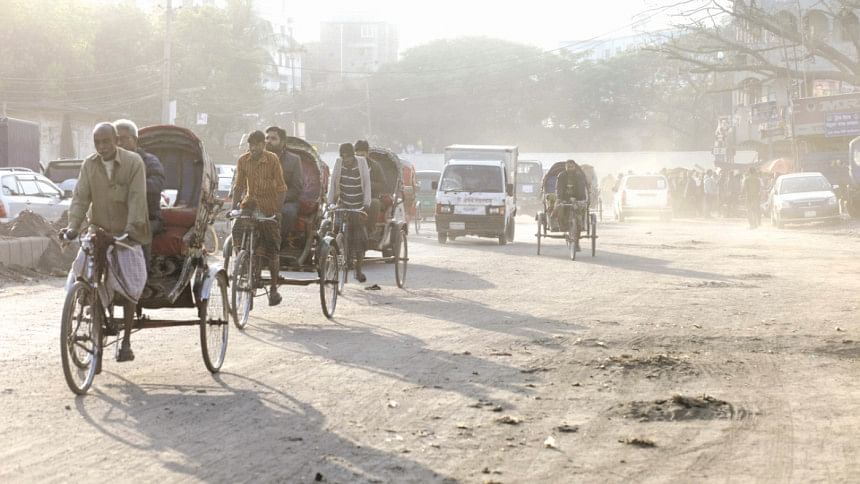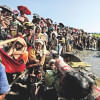Dusty streets in city pose health risks

Dry weather, compounded by waning greenery and heavy construction work, has turned Dhaka's air seriously polluted.
Doctors say the high level of air pollution has increased number of patients with coughing and breathing problems in winter.
The capital city's air is thick with dust due to construction of residential buildings and a number of flyovers, and digging of roads for installing utility lines.
Locals in different city areas have said most of these "development works" are done without spraying any water to minimise dust.
“Although these problems are not serious in nature, prolonged exposure to dusty air may lead to lung cancer or interstitial lung disease (ILD),” Kazi S Bennoor, assistant professor of respiratory medicine at National Institute of Diseases of Chest and Hospital (NIDCH), tells The Daily Star.
ILD reduces the amount of oxygen in the body, and can cause death, he says.
“Both the toxic air and dust pollution can cause diseases like asthma, bronchitis, chronic obstructive pulmonary disease, nasal allergy and rhintis," he says, adding two more diseases, silicosis and asbestosis, have also increased recently.
Workers who engage with stone crunching without taking precaution are exposed to silicosis while those in the ship breaking industry may contract asbestosis, he says.
Silicosis and asbestosis are also caused by ILD which reduces the amount of oxygen in the body and the effectiveness of lungs and can cause death, he adds.
The specialist physician strongly recommends spraying water at construction sites twice a day.
According to Bangladesh Environment Conservation Act 1995, building owners must prevent noise pollution, dust spread or any other nuisance during construction.
However, talking to a number of developers and building owners, it has been learnt that they do not take measures to prevent spread of dust as it "takes time and money".
Director General of the Department of Environment (DoE) Raisul Alam Mondal says air is polluted by brick fields, vehicles and dust.
Echoing Dr Bennoor, he says a huge amount of dust is generated every day at sites where buildings are constructed and roads are dug and dust spread is a major reason of health hazards in the city.
Another DoE official, who has spoken on condition of anonymity, says action will be taken against building owners for sound or air pollution if complaints are filed with the department.
Wasa is now playing a major role in spreading dust as it is digging roads in different parts of the city to set up water pipelines.
The construction work of Moghbazar flyover is another major source of dust pollution, as construction supervisors do not spray water around the site. Residents in the area have complained they are forced to inhale dust every day.
Though the Mayor Md Hanif flyover is functioning for around the last two years, commuters who use the road under the flyover are exposed to clouds of dust every day as the condition of the road is very poor.
Firoz A Mujahid, a resident of Rayerbazar, has been suffering from bronchitis for several years. He says residents of Rayerbazar have found themselves exposed to heavy dust as utility service organisations frequently dig roads and leave them unrepaired for long. Construction of residential buildings is another reason for the dust, he adds.
Mujahid says all of the six members in his family are suffering from either bronchitis or dust allergy due to the area's highly polluted air which is aggravated by tannery waste.
His doctor, assistant professor Abdus Shakur Khan, chest and medicine specialist of NIDCH, has informed him that a good number of his patients come from Rayarbazar, Jhigatola and Hazaribagh.
Sohel Ahmed, a resident of Gandaria, goes to Gulistan every day by rickshaw, using the road under the the Mayor Md Hanif flyover. He says he has already faced lung problems and his doctor has strongly advised him to wear mask outside his home and office.
Rumana Sharmin, a student of State University and a resident of Lalmatia, says she is forced to use a scarf to walk down the road in front of Lalmatia Mahila College.
"Wasa has been digging roads in different parts of Lalmatia since last month but there is no sign of repairing those," she says.
DSCC Mayor Sayeed Khokan at a programme on Sunday said it's the bulding owners' duty to spray water at construction sites.
“We have taken initiative to purchase more water lorries and we will be able to solve the problem in the next three to four years,” he said.
About the poor condition of roads, the mayor said they would start repairing work of 300 roads of DSCC soon.

 For all latest news, follow The Daily Star's Google News channel.
For all latest news, follow The Daily Star's Google News channel. 








Comments